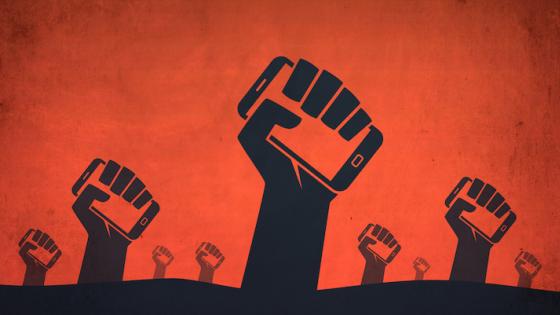
How the ‘Facebook cooperative’ could point the way for the network economy
Hans-Jörg Naumer makes the case for data cooperatives that would allow the providers of data, i.e. the users, to own shares in the platforms they use.
Search the site

Hans-Jörg Naumer makes the case for data cooperatives that would allow the providers of data, i.e. the users, to own shares in the platforms they use.
We're all online. We're all contactable at all times, our smartphones know where we are better than our partners do. We use WhatsApp, Facebook and Twitter, and some of us check our “likes” every now and then, which supposedly provide the ultimate proof that we are not yet dead on social media. We all leave countless data trails behind us, whether or not we're aware of it, and console ourselves with the thought that we have nothing to hide.1 And when we travel around in the real world, we use smartwatches and Uber – data streams are everywhere. But are we prepared for the network economy?
This does not answer the fundamental question of who the data actually belongs to. The fact is that we generally transfer our data free of charge in the expectation of receiving a service and trust the general terms and conditions to protect us against abuse. We acknowledge this by clicking a button to give our consent. We don't tend to get a chance to adapt this to our requirements. Acceptance or consent – you can be in or out, but there is no middle ground.
Privacy versus convenience, data ownership versus usage, is the tacit trade-off.
But who says we have to stick with this data capitalism? Why shouldn't the data providers, i.e. the users, own a share in the platform? They could then internalise the network externalities, which are the reason that tech has gone “wild”.
The cooperative as a legal form would offer a good starting point: the platform belongs to the users, not the operators. Participants receive a share in the cooperative, and thus ownership and voting rights, in proportion to the volume of data they generate. They also receive a corresponding share of the profits.
To prevent data from being generated for its own sake, assessment criteria such as "likes", recommendations, and so on could be used to provide an additional weighting. The users, i.e. the owners, determine the assessment process. Anyone who generates data clutter or is not active will not have a share in earnings.
The platform operators themselves are no longer the owners, but instead are service providers that are remunerated for developing/refining the technology and for marketing, data protection, storage costs etc. This remuneration may take the form of a share in the profits, for example. As they are competing against other providers, it is in their interests to offer the best service at the best price.
To ensure that there is proper competition among service providers, i.e. the operators of platforms organised as cooperatives, and that no monopolies or cartels are created that could then put up their fees and/or reduce dividend payouts by the cooperative, the legal framework must ensure connectivity between platforms. Not only can personal profiles and data be transferred to another provider at the click of a mouse (they are private property), but members themselves can connect with each other. In concrete terms, what that means is that anyone who is on Facebook can see what Xing or Twitter members who are connected to him are posting and vice versa, provided that this is by mutual consent. Why shouldn't social networks make something work that has been standard in emails from the beginning? Anyone can communicate with anyone else, irrespective of which provider he is using.
The data cooperative is based on two legal foundation pillars:
In paradigmatic terms, this involves combining a tried and tested legal form, the cooperative, with the requirements of the network economy. It's about the "Facebook cooperative", or more precisely, it's about data cooperatives.
As data streams are everywhere, different cooperatives could be established, or users could be given an ID that would also guarantee their privacy. In conjunction with blockchain technology, this would ensure that income from the data they generate would accrue to the users themselves.3
The advantages of data cooperatives would be:
And naturally there's what is probably the most important advantage: if there are no longer exclusive owners or corporations in which ownership of capital is kept separate from provision of data, this will help to counteract the concentration of capital. Saving capitalism – capitalism is understood here not as an ideological battle cry, but as a social system based on private ownership – from the concentration of capital is the solution. The concentration of capital and a lack of competition will destroy the market economy.4
More than two hundred years after the birth of Friedrich Wilhelm Raiffeisen, the founder of cooperatives,5 the "Facebook cooperative" can point the way for the network economy.
(1 The fact that this is the wrong attitude is demonstrated, for example, by Daniel J. Solove's essay "I’ve Got Nothing to Hide and Other Misunderstandings of Privacy".
(2) In memory of Franz Böhm, German politician, lawyer, and economist who established together with Walter Eucken the “Freiburger Schule”.
(3) An illustrative description of this can be found in Blockchain Revolution: How the Technology Behind Bitcoin Is Changing Money, Business, and the World, by Don Tapscott and Alex Tapscott.
(4) Didn't Joseph Schumpeter think that capitalism tends to destroy its "protective shell"?
(5) Friedrich Wilhelm Raiffeisen was born on 30 March 1818.